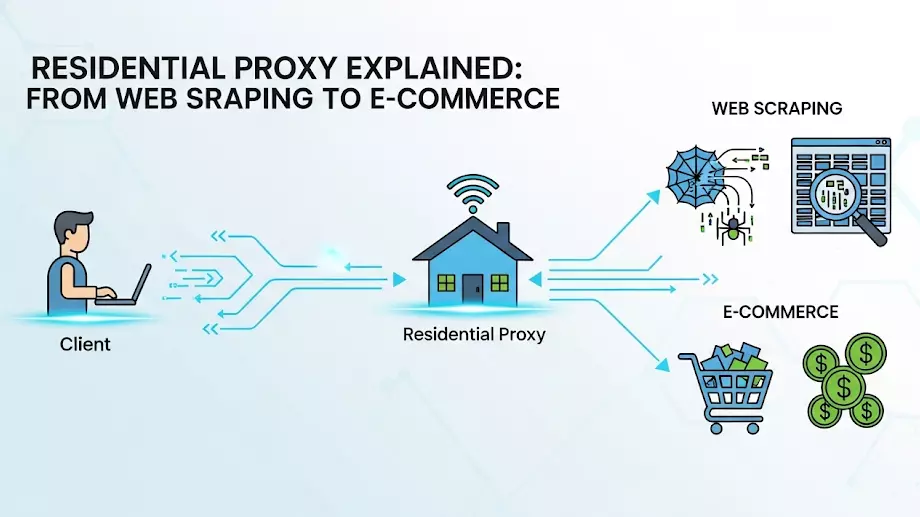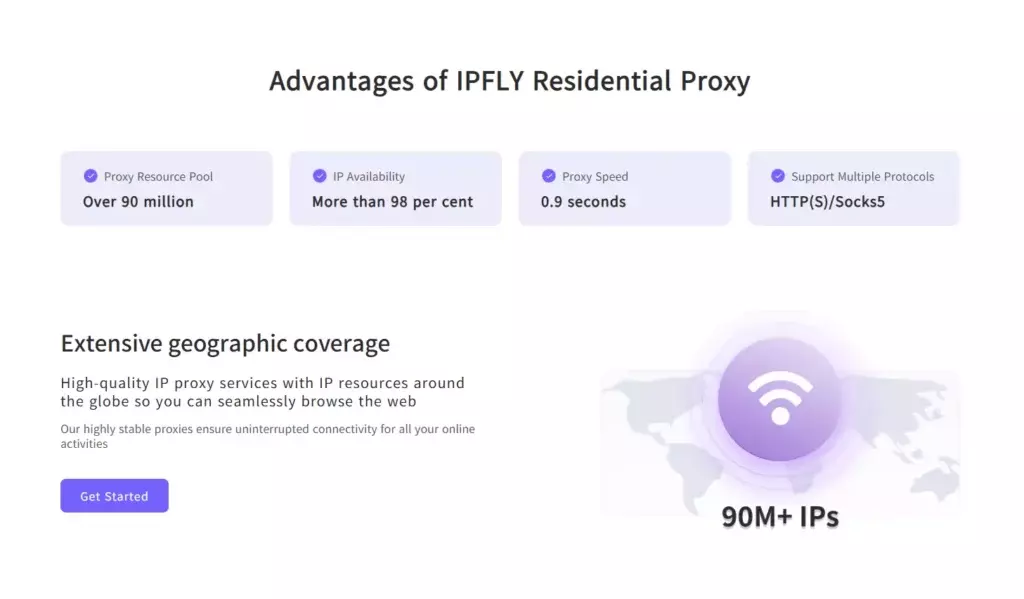In today’s competitive online landscape, accurate and timely data is crucial for businesses, marketers, and analysts. For e-commerce operations and market research, gathering information from websites around the globe can be challenging due to restrictions, anti-bot measures, and regional limitations. Residential proxies provide a solution by delivering authentic IP addresses that make your requests appear as legitimate users, allowing you to collect data efficiently and securely.
This guide focuses on how residential proxies are applied in web scraping and e-commerce, highlighting their benefits, workflows, and practical applications.

Understanding Residential Proxies
A residential proxy is an IP address assigned by an Internet Service Provider (ISP) to a real household. Unlike data center proxies, which originate from servers and are often flagged as non-human, residential proxies are recognized as authentic traffic by websites.
Residential proxies can be:
- Static: Maintain the same IP for long-term tasks, such as managing multiple accounts or consistent scraping.
- Rotating: Automatically change IPs between requests to avoid detection and allow high-volume data collection.
Their authenticity makes residential proxies ideal for applications that require reliability and scalability, particularly in web scraping and e-commerce.
How Residential Proxies Power Web Scraping
Web scraping involves extracting data from websites to gain insights for competitive intelligence, market research, or operational decisions. Residential proxies are essential for scraping large datasets without being blocked or restricted.
Key Benefits of Web Scraping
- Avoid Blocks and CAPTCHA Residential IPs appear as normal users, reducing the risk of being flagged or blocked during repeated requests.
- Geo-Specific Data Collection Many websites display different content based on the visitor’s location. Residential proxies allow scraping from multiple regions simultaneously, providing accurate global data.
- High-Volume Operations Rotating residential proxies enable thousands of concurrent requests, accelerating data collection without triggering anti-bot defenses.
- Improved Data Accuracy By mimicking real user traffic, residential proxies ensure complete, reliable, and unbiased data collection.
Example Use Case: An e-commerce analytics team wants to monitor competitor pricing across multiple countries. Using residential proxies, scraping scripts can run simultaneously from different regions, collecting data on pricing, inventory, and promotions in real time. This allows businesses to adjust pricing strategies or stock levels quickly.
Residential Proxies in E-Commerce
E-commerce businesses depend on accurate data for pricing, inventory, and marketing strategies. Residential proxies support these tasks by providing reliable access and ensuring data collection is uninterrupted.
Key E-Commerce Applications
- Price Monitoring Businesses can track competitor prices across various regions and adjust their own pricing dynamically. Residential proxies allow simultaneous location-based requests, providing comprehensive market insights.
- Inventory Tracking Knowing which products are in stock on competitor websites helps businesses plan promotions and maintain optimal inventory levels. Residential proxies prevent blocks during frequent requests, ensuring data reliability.
- Market Research and Trend Analysis Residential proxies enable the collection of product reviews, ratings, and user feedback across regions. Companies can identify trending products, monitor customer sentiment, and make informed decisions.
- Ad Verification For global campaigns, businesses can ensure their ads are displayed correctly in different countries. Residential proxies allow verification of campaign performance from multiple regions without exposing the company’s original IP.
- Dynamic Campaign Adjustments Residential proxies allow businesses to make real-time adjustments to promotions, pricing, or product visibility based on collected data.
Example Scenario: A fashion retailer launching a global product line can monitor trends and promotions across multiple regions. Residential proxies allow the marketing team to collect real-time insights, adjust campaigns, and maximize engagement and sales.
Practical Web Scraping Workflows with Residential Proxies
Using residential proxies efficiently requires planning and best practices:
- Rotate IPs for High-Volume Scraping Using rotating residential proxies ensures requests are spread across multiple IPs, reducing the risk of detection.
- Parallel Requests Sending multiple requests simultaneously speeds up data collection. Combining residential proxies with parallel processing enables businesses to gather more data in less time.
- Monitor Success Rates Track which IPs succeed or fail to ensure scraping workflows are effective and uninterrupted.
- Leverage Automation Tools Integrating residential proxies with automation platforms or scripts allows seamless, large-scale scraping operations.
Challenges in Web Scraping and E-Commerce
While residential proxies provide reliable access, high-volume scraping and e-commerce monitoring present challenges:
- IP Blocks and Rate Limits: Sending many requests from the same IP can lead to blocks. Rotating residential proxies mitigates this risk.
- Load Distribution: Handling thousands of concurrent requests requires efficient management across multiple IPs.
- Data Accuracy: Failed requests or partial scraping can skew analytics. Residential proxies reduce these errors by maintaining stable, authentic connections.
- Compliance: Businesses must respect website policies and privacy regulations. Residential proxies allow safe data collection without exposing personal IPs.
How IPFLY Supports Web Scraping and E-Commerce

IPFLY provides professional residential proxies tailored for data-intensive tasks:
- Extensive Global IP Pool: Over 90 million IPs covering 190+ countries.
- Static and Rotating Options: Suitable for consistent account management or high-volume scraping.
- High Success Rates: Minimize the risk of blocks and ensure uninterrupted data collection.
- Scalable Infrastructure: Supports thousands of concurrent requests for global operations.
- Secure Connections: Ensures safe, reliable access to websites for e-commerce and analytics tasks.
By combining residential proxies with optimized scraping workflows, businesses can monitor competitors, track inventory, verify ads, and gather actionable insights efficiently.
Best Practices for Using Residential Proxies
- Use Rotating IPs for Large-Scale Scraping – Prevent detection and improve success rates.
- LeverageParallel Processing – Run multiple tasks simultaneously to speed up operations.
- Monitor Proxy Performance – Track response times, blocked requests, and overall efficiency.
- Choose Trusted Providers – Ensure reliability, privacy, and compliance. IPFLY meets professional standards for high-demand workflows.
- Plan Requests Strategically – Optimize scraping frequency and avoid overloading target websites.
Conclusion

Residential proxies are essential for businesses relying on web scraping and e-commerce operations. They provide authenticity, scalability, and reliability, allowing companies to collect data, monitor competitors, and optimize strategies effectively.
With IPFLY residential proxies, organizations gain access to a secure, global network that supports large-scale scraping, pricing intelligence, market analysis, and campaign verification. By integrating residential proxies into workflows, businesses can make faster, data-driven decisions and stay competitive in the global market.
👉 Join the IPFLY Telegram community to stay updated on residential proxy solutions, web scraping strategies, and e-commerce insights.


